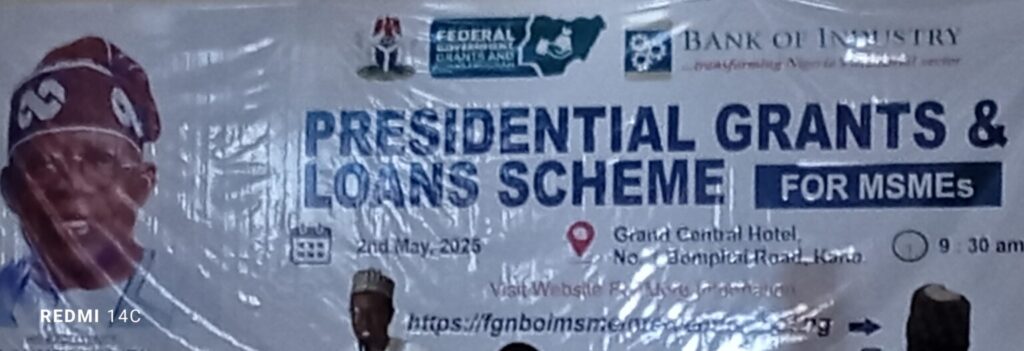The Federal Government has distributed over N107 billion to around 900,000 beneficiaries of Micro, Small, and Medium Enterprises (MSMEs) across Nigeria’s six geo-political zones.
Correspondents report that the disbursement is part of the Presidential Grant and Loan Scheme designed to support MSMEs.
The Managing Director of the Bank of Industry (BOI), Dr Olasupo Olusi, disclosed this at a sensitisation event held in Kano State on Friday. Olusi was represented by BOI’s Regional Manager in Kano, Aminu Yusuf.
According to him, Kano State alone recorded 51,033 beneficiaries, with disbursements exceeding N12.54 billion.
He stated that N50 billion of the intervention fund was earmarked for one million nano businesses — including market women, vulcanisers, food vendors, tailors, and others — who each receive a grant of N50,000 in all 774 local government areas of the country.
He assured that more loans would be made available to support the growth and stability of MSMEs.
Olusi explained that the disbursements fall under the broader N200 billion Presidential Intervention Fund, which is a key initiative of President Bola Tinubu’s administration aimed at empowering small businesses and revitalising Nigeria’s manufacturing sector.
He said the scheme includes loans of up to N5 million, offered at a single-digit interest rate of 9 per cent per annum, with a three-year repayment period and no collateral required.
“This initiative is more than a policy directive, it’s an investment in Nigeria’s future. It’s a commitment to fostering inclusive economic growth by unlocking the potential of our most dynamic business segments,” he stated.
Olusi highlighted that MSMEs account for 96 per cent of businesses in the country, provide 84 per cent of jobs, and contribute nearly half of Nigeria’s Gross Domestic Product (GDP).
“In Kano, we see firsthand how MSMEs bring life to the local economy. They create jobs, provide livelihoods, and drive innovation,” he added.
He acknowledged the challenges facing MSMEs, including limited access to capital and high operational costs, noting that the intervention fund was designed to help address these issues.
Olusi also mentioned the remaining N75 billion under the Manufacturing Sector Fund (MSF), which is targeted at resolving the constraints confronting Nigerian manufacturers, such as rising input costs, infrastructure deficits, and disruptions in the supply chain.
In his remarks, Bashir Jafa, State Manager of the Kano office of the Small and Medium Enterprises Development Agency of Nigeria (SMEDAN), said the agency is actively educating entrepreneurs on how to access the available loans and grants.
One of the beneficiaries, Hauwa Ali, a fashion designer, commended the initiative and urged other small business owners to seize the opportunity to grow their ventures.
(NAN)


